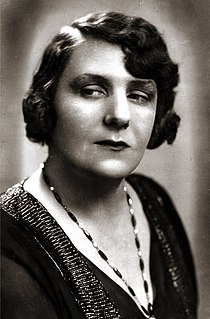Zofia Nałkowska
Zofia Nałkowska | |
|---|---|
 | |
| Born | 10 November 1884 Warsaw, Congress Poland, Russian Empire |
| Died | 17 December 1954 (aged 70) Warsaw, Polish People's Republic |
| Nationality | Polish |
| Notable works | Granica (Boundary) Medaliony (Medallions) |
Zofia Nałkowska ([ˈzɔfia nawˈkɔvska], 10 November 1884, in Warsaw, Congress Poland – 17 December 1954, in Warsaw) was a Polish prose writer, dramatist, and prolific essayist. She served as the executive member of the prestigious Polish Academy of Literature (1933–1939) during the interwar period.
Biography
[edit]Nałkowska was born into a family of intellectuals dedicated to issues of social justice, and studied at the clandestine Flying University under the Russian partition. Upon Poland's return to independence she became one of the country's most distinguished feminist writers of novels, novellas and stage-plays characterized by socio-realism and psychological depth.
Literary output
[edit]Nałkowska's first literary success was the Romans Teresy Hennert (The Romance of Teresa Hennert, 1923) followed by a slew of popular novels. She is best known for her books Granica (Boundary, 1935), the Węzły życia (Bonds of Life, 1948) and Medaliony (Medallions, 1947).
In her writing, Nałkowska boldly tackled difficult and controversial subjects,[1] professing in her 1932 article "Organizacja erotyzmu" (Structure of Eroticism) published in the Wiadomości Literackie magazine – the premier literary periodical in Poland at the time – that:
...a rational, nay, intellectual approach to eroticism must be encouraged and strengthened, to allow for a consideration of eroticism in conjunction with other aspects of the life of the human community. Eroticism is not a private matter of the individual. It has its ramifications within all domains of human life and it is not possible to separate it from them by way of contemptuous disparagement in the name of morality, discretion, or yet by a demotion on the hierarchy of subjects worthy of intellectual attention: it cannot be isolated by prudery or relegated to science for its purely biological dimension."[2]

Tribute
[edit]On 10 November 2014 Google celebrated her 130th birthday with a Google Doodle.[3]
From May 2024, a manuscript Nałkowska's Diary is presented at a permanent exhibition in the Palace of the Commonwealth in Warsaw.[4][5]
Works
[edit]Novels
[edit]- Kobiety (Women, 1906), translated by Michael Henry Dziewicki, 1920
- Książę (The Prince, 1907)
- Rówieśnice (Contemporaries, 1909)
- Narcyza (1911)
- Noc podniebna (Heavenly night, novella, 1911)
- Węże i róże (Snakes and roses, 1914)
- Hrabia Emil (Count Emil, 1920)
- Na torfowiskach (At the bogs, 1922)
- Romans Teresy Hennert (The Romance of Teresa Hennert, 1923), translated by Megan Thomas and Ewa Malachowska-Pasek, 2014
- Dom nad łąkami (House upon the meadows, autobiography, 1925)
- Choucas (1927), translated by Ursula Phillips, 2014 (winner of the Found in Translation Award 2015)
- Niedobra miłość (Bad love, 1928)
- Granica (Boundary, 1935), translated by Ursula Phillips, 2016
- Niecierpliwi (Anxious,1938)
- Węzły życia (Living ties, 1948)
- Mój ojciec (My father, 1953)
Short stories
[edit]- Medaliony (Medallions, 1946), a collection of 8 short stories about German World War II atrocities in occupied Poland, translated by Diana Kuprel, 2000
Stage plays
[edit]- Dom kobiet (1930)
- Dzień jego powrotu (1931) (The Day of his Return, translated by Marja Slomczanka, performed 1931)
- Renata Słuczańska (1935)
Further reading
[edit]- From Corsets to Communism: The Life and Times of Zofia Nalkowska by Jenny Robertson (Scotland Street Press, 2019) [6]
See also
[edit]References
[edit]- ^ Stanisława Dudzianka (14 October 2009). "Oblicza polskiego feminizmu (Faces of Polish feminism)" (in Polish). Deon.pl. Retrieved July 20, 2012.
- ^ Zofia Nałkowska, "Organizacja erotyzmu", Wiadomości Literackie, vol. 9, No. 25 (442), 19 June 1932, p. 7. Quote in Polish: należy wymóc na sobie stosunek do zagadnień erotyzmu właśnie intelektualny, rozumowy, pozwalający je rozważać w splocie i wzajemnej zależności z innemi dziedzinami życia zbiorowego. Erotyzm nie jest prywatną sprawą człowieka. Wysyła on swe rozgałęzienia do wszystkich tych dziedzin i nie da się ani w imię wzgardliwego lekceważenia, ani moralności, ani dyskrecji, ani nawet w imię hierarchji tematów, godnych intelektualisty, od życia społecznego odciąć, nie da się w niem wstydliwie izolować i do swego zakresy ściśle biologicznego ograniczyć. (source)
- ^ "Zofia Nałkowska's 130th Birthday". Google. 10 November 2014.
- ^ "Palace of the Commonwealth open to visitors". National Library of Poland. 2024-05-28. Retrieved 2024-06-11.
- ^ Makowski, Tomasz; Sapała, Patryk, eds. (2024). The Palace of the Commonwealth. Three times opened. Treasures from the National Library of Poland at the Palace of the Commonwealth. Warsaw: National Library of Poland. p. 191.
- ^ "Scotland Street Press | Bookstore | From Corsets to Communism". www.scotlandstreetpress.com. Retrieved 2022-06-08.
- Mortkowicz-Olczakowa, Hanna (1961). Bunt wspomnień. Państwowy Instytut Wydawniczy.
External links
[edit] Media related to Zofia Nałkowska at Wikimedia Commons
Media related to Zofia Nałkowska at Wikimedia Commons- Works by Zofia Nałkowska at Project Gutenberg
- Works by or about Zofia Nałkowska at the Internet Archive
- 1884 births
- 1954 deaths
- Writers from Warsaw
- People from Warsaw Governorate
- Members of the State National Council
- Members of the Polish Sejm 1947–1952
- Members of the Polish Sejm 1952–1956
- Women members of the Sejm of the Polish People's Republic
- 20th-century Polish diarists
- Polish feminists
- Women diarists
- Polish women essayists
- Polish essayists
- Polish women writers
- Polish women novelists
- Polish women short story writers
- 20th-century Polish novelists
- 20th-century Polish dramatists and playwrights
- Members of the Polish Academy of Literature
- Golden Laurel of the Polish Academy of Literature
- Officers of the Order of Polonia Restituta
- Recipients of the Order of the Banner of Work
- Burials at Powązki Cemetery
- 20th-century essayists
- Recipients of the State Award Badge (Poland)
- 20th-century Polish women
- 20th-century Polish women politicians
- Flying University alumni
- Recipients of the Medal of the 10th Anniversary of the People's Republic of Poland
